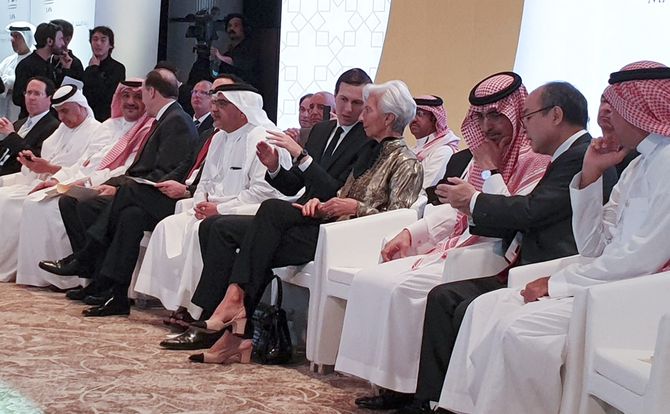A rocky start for “the deal of the century”
The unveiling of the $50 billion U.S. investment plan to secure peace in the Middle East by improving conditions in the West Bank and Gaza met international skepticism and opposition from the Palestinian authorities. But for President Donald Trump, solving the conflict none of his predecessors could gain him international recognition.

In a nutshell
- Critics underrate the realism of the Trump administration’s peace plan for the Middle East
- The Manama workshop was intended to show investors a new approach may work
- Whether it does depends on how Palestinian public opinion swings on the West Bank
President Donald Trump’s administration unveiled the economic part of its proposed solution to the Israeli-Palestinian conflict in Manama, the capital of Bahrain, at the“Peace to Prosperity” economic workshop on June 25-26.
Finance ministers and business executives from around the world were invited to contribute to a $50 billion investment program to provide better conditions to the Palestinians and help the economies of neighboring Jordan, Egypt and Lebanon. The idea was to induce more Palestinian flexibility in future negotiations on the political aspects of the plan, to be unveiled at a later date – in all likelihood this autumn, after Israel holds a new round of parliamentary elections in November.
Prestige project
For President Trump, resolving a conflict none of his predecessors had been able to is a high priority. It would bring him the international recognition he craves and enthusiastic support from evangelical Christians, a vital part of his core constituency.
During the 2016 election campaign, Mr. Trump spoke of proposing an “ultimate deal,” and upon being elected he appointed three senior officials to draft what he called “the deal of the century.” His close advisor and son-in-law Jared Kushner led the team, assisted by Jason Greenblatt, the former chief legal officer to the Trump Organization, and David Friedman, who also served as a legal advisor to the president before his confirmation as U.S. ambassador to Israel in early 2017.
The main opposition to the plan came from its intended beneficiaries, the Palestinians.
The team worked in secrecy for more than two years. From time to time, individual members gave hints to garner support from the pragmatic Arab countries – the Gulf states, Egypt and Jordan – that formed the nucleus of the emerging Sunni coalition against Iran, but without touching on the essence of the plan.
Reluctant beneficiaries
It soon became evident that opposition to the plan came mainly from its intended beneficiaries, the Palestinians, whose leaders rejected out of hand the idea that a deal they knew nothing about could provide the basis for negotiations.
Palestinian-American relations were already at an all-time low. Following the U.S. recognition of Jerusalem as the capital of Israel in December 2017 and the transfer of the American embassy to that city the following year, the president of the Palestinian Authority, Mahmoud Abbas (also known as Abu Mazen), declared there would be no dialogue with the U.S., which had renounced its status as an honest broker. President Trump retaliated by closing down the Palestine Liberation Organization’s (PLO) office in Washington and by cutting off financial assistance to the Palestinian Authority and to the United Nations Relief and Works Agency for Palestine (UNRWA), which had relied on U.S. contributions for one-third of its annual budget.
Faced with a barrage of criticism over the embassy relocation, the Trump administration’s position is that recognizing Jerusalem as the capital of Israel is merely acknowledging a reality and that the city’s borders will be fixed through negotiations. UNWRA, meanwhile, has become a tool to perpetuate refugee status for Arabs who fled during the 1948-1949 war – a conflict initiated by five Arab states to destroy a Jewish state established by a UN partition plan and recognized by that organization.
Mr. Trump wants to take two insoluble issues — Jerusalem and the refugees — off the negotiating table.
The 600,000 Arabs who fled at that time have allegedly “transmitted” their refugee status to their descendants, whose numbers the Palestinian Authority now estimates at 5 million. This legal practice is not recognized by international law. President Trump has repeatedly stated that it is up to Arab states to integrate the descendants of these refugees, in much the same way as European states dealt with refugees after the two world wars, or India and Pakistan after the 1948 partition. After all, this is an Arabic-speaking Muslim Arab population sharing the same secular and religious culture.
Fact-based policy
For the American president, taking two insoluble issues — Jerusalem and the refugees — off the negotiating table removes the main stumbling block to achieving peace between the Israelis and Palestinians, even though the latter strongly reject it. Palestinian leaders will reject any plan that does not provide for a Palestinian state within the pre-1967 borders, with East Jerusalem as its capital and the so-called “right of return” for the 5 million alleged refugees. If fulfilled, these demands would spell the end of Israel.
Palestinian advocates conveniently forget that between 1948 and 1967, the West Bank of the Jordan River and East Jerusalem were under Jordanian rule. During this period, it was not Israel that prevented Palestinians from creating their own state; in fact, they never demanded it. Furthermore, immediately after the Six-Day War in June 1967, Israel offered to return the West Bank to Jordan in exchange for peace. The proposition met with three resounding “no’s” at a special Arab League summit in Khartoum on September 1, 1967: “No to peace with Israel, no to recognition of Israel, no to negotiations with Israel.”
The general strategy is to work first for better living conditions.
In 2000, when U.S. President Bill Clinton obtained Israeli agreement to a plan to establish a Palestinian state including East Jerusalem, it was PLO leader Yasser Arafat who turned it down. Israel Prime Minister Olmert (2006-2009) made a similar offer to Arafat’s successor Abu Mazen in 2007, with similar results. U.S. President Barack Obama later pressured Israel into freezing settlement activities for nine months, as demanded by the Palestinians in order to begin talks. Israel complied and still the Palestinians refused to come to the negotiating table.
In other words, the American president’s position is grounded in solid facts, not on a whim or his personal friendship with Israeli Prime Minister Benjamin Netanyahu. Mr. Trump is convinced that after decades of failed attempts to set up an independent Palestinian state, new paths should be explored.
Economic icebreaker
Nobody knows the political details of the deal, but from the glossy “Economic Plan” presented by Jared Kushner at the Manama workshop, it is clear the general strategy is to work first for better living conditions for Palestinians. New investment of about $50 billion would be raised from foreign sources over 10 years to foster sustainable economic growth through infrastructure investments and technology transfers.
Neighboring countries with substantial Palestinian populations, such as Jordan, Lebanon and Egypt (which has a long border with the Gaza Strip), would also benefit from the investment package.
Economic cooperation would ultimately lead to better Arab-Jewish relations.
The expected rise in economic cooperation, trade and living standards would ultimately lead to better relations between Jews and Arabs on the West Bank and to fewer terrorist attacks. In the not-too-distant future, the political climate would have sufficiently thawed for stable state institutions to be established in the Palestinian Authority.
This has been the goal ever since the 1993 Oslo agreements established an autonomous Palestinian government in the greater part of the West Bank, including all the major cities and 90 percent of the population. Unfortunately, the new entity was soon mired in corruption and human rights violations.
Legitimacy deficit
The presidential mandate of Abu Mazen, elected in 2005 following the death of Yasser Arafat, has long expired but no elections are scheduled; the same applies to the Palestinian Authority’s parliament. Both have lost their constitutional legitimacy.
Another huge setback was the 2007 seizure of power in the Gaza Strip by the Hamas movement, which severed its links with the central government in Ramallah and began plotting openly to assume control of the West Bank as well.

Asked in a June interview before the Manama conference whether the Palestinians are capable of setting up a stable, autonomous government, Jared Kushner was cautious. “I think that’s one that we’ll have to see. The hope is that they over time can become capable,” he said. Mr. Kushner refrained from answering the most urgent question — whether the peace plan provides for the creation of an independent Palestinian state — but he did say that Palestinians are entitled to self-determination.
Arm-twisting
The only answer given by Palestinian officials and spokesmen, from the president to the prime minister and Fatah and PLO leaders, has been a comprehensive “no,” including a resolute refusal to attend the workshop. Whoever attended the Manama meeting, they said, was a traitor to the Palestinian cause ready to renounce the right of the Palestinians to a country of their own for material gain. Consequently, the Palestinian Authority officially called on private investors and entrepreneurs not to attend.
Not surprisingly, Hamas and the Palestinian Islamic Jihad strongly opposed the plan and the workshop. Their position is aligned with Iran and Hezbollah, which view the “deal of the century” as a trap to liquidate the Palestinian problem.
In the weeks prior to the workshop, Mr. Kushner and Mr. Greenblatt traveled from one Arab country to another trying to muster support. Only the United Arab Emirates and Saudi Arabia gave it their full endorsement, sending high-level delegations. After some hesitation, Egypt and Jordan also agreed to attend, but were represented at the deputy minister level.
Jordan was in a quandary, as two-thirds of its population is Palestinian.
Jordan, in particular, was in a quandary. Two-thirds of its population is Palestinian, many of whom are inclined to follow Ramallah’s lead. Many are also members of the Muslim Brotherhood, which wants the peace agreement canceled and Israel destroyed. Jordan’s King Abdullah II realized that participating in the workshop could lead to violent demonstrations, but he ultimately bowed to intense American pressure.
On the other hand, sources in Cairo and Riyadh indicate that Abu Mazen had been urged by Egypt, Saudi Arabia and the UAE to stop attacking the workshop and let private business people attend. Several Palestinian businessmen did show up at the meeting, although one, 49-year Saleh Abu Mayaleh, was reportedly detained by the Palestinian Authority on his return to Hebron.
Diplomatic silence
In its response to the initiative, the Arab world was politely noncommittal. At three separate summits of Arab and Islamic countries held by Saudi Arabia in the holy city of Mecca on May 30-31, the nearly exclusive focus was on presenting a united front against the Iranian threat; the Bahrain workshop was not mentioned. Statements issued after the meetings dealt mainly with Iran, although at the request of Abu Mazen, they also condemned the U.S. recognition of Jerusalem as the capital of Israel and the transfer of the American embassy. They also reiterated the Arab position that a Palestinian state must be created within the pre-1967 borders, with East Jerusalem as its capital.
Notably absent from the communiques, however, was any condemnation of President Trump’s peace plan or the Manama meeting. This suggests that each country was given latitude to act according to its own interests.
Jared Kushner was especially intent on lining up European Union support for the Bahrain workshop, visiting Brussels twice in the preceding month. EU High Representative Federica Mogherini confirmed during a June 19 meeting with Mr. Kushner in Washington, D.C. that Brussels was ready to work with Washington, but only within the context of a negotiated two-state solution. At Manama, the EU was represented by a relatively low-level “technical” delegation.
Manama’s results
The workshop was mostly intended as a means to demonstrate to the potential beneficiaries and investors how the situation could be changed. Over 300 delegates from some 30 countries attended, mainly business people, including chief executives of leading American companies such as the Blackstone Group and AT&T. Saudi Arabia and the UAE sent their ministers of economy and finance.
Israel sent no official delegation, because the Palestinian Authority refused to participate. Even so, 15 Palestinian businessmen arrived in spite of the boycott. Christine Lagarde, the managing director of the International Monetary Fund, and Antonio Guterres, the secretary-general of the United Nations, gave an international seal of approval to the proceedings.
The rapprochement between the Gulf states and Israel was on display at Manama.
The Manama meeting was also a public display of the rapprochement between the Gulf countries and Israel. A number of Israeli business leaders were in attendance. Six Israeli journalists were invited by the Bahraini Crown Prince and allowed to circulate freely among the participants. Bahrain’s Minister of Foreign Affairs Khalid bin Ahmed al-Khalifa did not hesitate to state openly, while flanked by his colleagues from the Gulf states, that “Israel is a country in the region, and it is there to stay, of course.”
The roadmap discussed at the workshop would double the size of the Palestinian economy within a decade, building up infrastructure, increasing the water supply, boosting exports and creating 1 million new jobs. For many commentators, however, the plan would not advance the establishment of an independent Palestinian state and is intended mostly to benefit Israel, even though the Israelis would have to accept some harsh compromises. Jared Kushner responded to such criticism at the end of the workshop:
It is easy to be against things, but that is not going to help the Palestinian people… What we have tried to do is take the harder task of being for something and we have put out 140 pages of details.
The details everyone wants are the peace plan’s political component. As the situation stands, it will probably be made public after Israel holds new elections and has time to form a new government. That points to the second half of November at the earliest – an awkward time for Mr. Trump, who will by then be focused on his reelection campaign. The president will not want controversies about the plan in the U.S. and Israel to detract from his economic achievements. These domestic political considerations could lead to yet another delay.
Hearts and minds
While there was a decent response from foreign investors, it is legitimate to ask whether private and public investment projects will materialize if the Palestinians refuse to accept them.
Much will depend on Palestinian public opinion. Though it cannot be expressed freely, and though incitement against Israel and the U.S. is at an all-time high, popular sentiment could be swayed by the prospect of a better life. Under the rule of the Palestinian Authority, living conditions are harsh and the political situation uncertain. The question is whether there are channels for public aspirations to be communicated to the Palestinian leadership.
Rejection of the peace plan will erase any hope of an understanding with Israel.
Continued rejection of the U.S. peace plan will erase any hope of an understanding with Israel, contributing to an erosion of living standards and an increase in terror. Ultimately, this chain of events could bring about a Hamas takeover on the West Bank. Yet many believe that Abu Mazen and his associates are betting that Mr. Trump will not be reelected and that a new Democratic president will rescind his initiatives. On the other hand, the struggle to succeed the elderly and ailing Palestinian leader has already begun, raising the possibility of new blood and a fresh approach.
Even the EU, unwilling as it is to align with President Trump, must realize the disastrous consequences of rejecting the peace plan with no replacement in sight. But perhaps it, too, is banking on a change of leadership in Washington.







